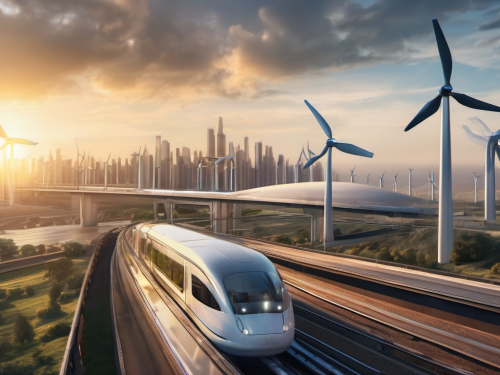
Renewable Energy and the Future of Transportation Networks

Renewable Energy and the Future of Transportation Networks
The intersection of renewable energy and transportation networks holds significant promise for the future of sustainable development. As the world grapples with the challenges of climate change and environmental degradation, transitioning to renewable energy sources in the transportation sector is crucial for reducing greenhouse gas emissions and mitigating the impacts of global warming.
Renewable energy, such as solar, wind, and hydroelectric power, provides a clean and sustainable alternative to traditional fossil fuels. By harnessing the power of these natural resources, we can create a more environmentally friendly transportation system that is less reliant on finite and polluting energy sources.
One of the key advantages of renewable energy in transportation is its potential to reduce carbon emissions. Electric vehicles (EVs) powered by renewable energy sources produce zero tailpipe emissions, helping to improve air quality and reduce the harmful effects of vehicle exhaust on human health and the environment. As the technology for EVs continues to advance and become more accessible, they have the potential to revolutionize the way we think about transportation and energy consumption.
In addition to EVs, renewable energy can also be integrated into other modes of transportation, such as public transit systems and freight networks. By electrifying buses, trains, and trucks with renewable energy, we can further reduce our reliance on fossil fuels and transition to a more sustainable transportation infrastructure. This shift towards renewable energy in transportation networks can also help to create new economic opportunities and jobs in the clean energy sector.
Another key benefit of renewable energy in transportation is its role in enhancing energy security and resilience. By diversifying our energy sources and reducing our dependence on imported fossil fuels, we can improve the stability and reliability of our transportation networks. In the face of natural disasters, geopolitical conflicts, or supply chain disruptions, renewable energy can provide a more resilient and decentralized energy system that is less vulnerable to external shocks.
As we look towards the future of transportation networks, it is clear that renewable energy will play a central role in shaping a more sustainable and efficient system. Investments in renewable energy infrastructure, such as charging stations for EVs and renewable energy-powered public transit systems, are essential for accelerating the transition to a low-carbon transportation sector.
However, there are still challenges to overcome in the widespread adoption of renewable energy in transportation. These include the need for greater investment in renewable energy technology, improvements in energy storage and grid integration, and policy support for renewable energy deployment. Governments, businesses, and individuals all have a role to play in driving the transition to a cleaner and more sustainable transportation system.
In conclusion, the integration of renewable energy into transportation networks offers a pathway towards a more sustainable and resilient future. By embracing clean energy solutions and reducing our reliance on fossil fuels, we can create a transportation system that is not only environmentally friendly but also economically viable and socially equitable. The time to act is now, and with concerted efforts and collaboration, we can build a transportation network that is powered by renewable energy and supports a more sustainable future for generations to come.









